We stand firm on three essential aspects of vehicle care: mastering tire changes, maintaining fluid levels, and consistently replacing your windshield wipers. Fortunately, our automotive experts have rigorously tested and selected the Best Wiper Blades available, ensuring your next set delivers exceptional longevity and performance.
Sudden downpours are a common driving hazard, and dependable wipers are crucial for maintaining control. For consistent, high-performance, we recommend the Rain-X Silicone Endura as our top pick. These silicone wipers offer superior durability. If you live in a drier climate, the AERO Voyager J-Hook wipers are an economical yet high-quality beam-style option.
While often overlooked, wiper blades are vital for driving safety. Navigating the market can be complex, but we’ve simplified it by identifying the top performers. From traditional to beam styles, and rubber to silicone materials, we break down the key factors. Our testing in the demanding Pacific Northwest climate highlights the best wiper blades that truly excel.
Editor’s Update: Our guide to the best wiper blades was refreshed on March 19, 2025, to include the AERO Voyager as our new best budget choice, and the Anco Winter Wiper as a superior option for winter conditions.
Top Windshield Wiper Blades of 2025
Best Overall Wiper Blades
Rain-X Silicone Endura
Rating: 9.1 / 10
Learn about our product rating process ⓘ
Key Features:
- Wiper Style: Beam
- Blade Material: Silicone
- Available Lengths: 14-28 inches
- Attachment Types: J-hook, pinch tab, pinch tab button, pin arm, side pin
Pros:
- Premium silicone blade with graphite coating for extended lifespan compared to rubber.
- Elevated pivot point maximizes windshield clamping pressure.
- Silicone blade applies a water-repellent treatment with each use.
- Secure locking clasp for firm attachment.
Cons:
- Higher price point compared to standard wiper blades.
- Less common in retail stores than the Rain-X Advantedge Premium series.
Expert Review:
The Rain-X Silicone Endura ($26) are unequivocally among the best wiper blades on the market today. They perfectly blend a robust beam structure, a durable silicone blade, and a built-in water repellent feature, delivering long-lasting performance that impressed us during testing.
Silicone wiper blades outshine traditional rubber squeegees, resisting degradation from UV exposure, ozone, and temperature extremes. Furthermore, their gradual silicone deposit action provides a Rain-X-like water-repellent effect, ensuring exceptional water beading and visibility.
In our tests, the Silicone Endura blades exhibited minimal streaking and were remarkably quiet, even at high speeds. Like many silicone blades, their performance improves over time as silicone builds up on the windshield. Prepping the windshield by running the wipers dry for a few cycles helps initiate this silicone deposition for immediate water repellency.
The robust mounting system of the Silicone Endura elevates the pivot point, increasing clamping force. While the J-hook attachment requires a specific technique (rotate blade perpendicular, then press tab), it’s straightforward once understood. The addition of a locking clasp provides extra security against detachment.
Comparing them directly to our premium choice, the PIAA Si-Techs, we observed virtually no discernible difference, even noting identical serial numbers, suggesting these wipers may be manufactured identically. Given the Enduras are often $10 cheaper per blade, they represent exceptional value and are our top recommendation for most drivers seeking the best wiper blades.
Best Budget Wiper Blades
AERO Voyager J-Hook
Check Price at Walmart $17 at Amazon
Rating: 6.1 / 10
Learn about our product rating process ⓘ
Key Features:
- Wiper Style: Beam
- Blade Material: Rubber
- Available Lengths: 13-28 inches
- Attachment Types: Small and large J-hook
Pros:
- Very affordable, especially as a set of two.
- DuPont Teflon coating for smoother operation.
- Includes a 1-year warranty for peace of mind.
- Comes with an extra set of rubber wiper inserts.
- Aerodynamic design with wiper arm cover.
Cons:
- J-hook attachment style only.
- Rubber blades may not clear water as effectively as silicone and can squeak when dry.
Expert Review:
Previously, we favored branch-style wipers for budget options, but the AERO Voyager J-Hook Wiper Blades ($17) have changed our perspective. These contemporary beam wipers offer superior design at an incredibly low price, making them the best wiper blades for budget-conscious buyers.
At just $17 for a pair, purchasing two sets for future replacement is highly economical. The inclusion of extra rubber inserts and a 1-year warranty further enhances their value. AERO deserves commendation for designing wipers with replaceable squeegees, promoting environmental responsibility compared to disposable designs.
While their rubber blades don’t displace water as efficiently as silicone in our tests, the Teflon coating significantly minimizes the squeaking often associated with untreated rubber.
The 1-year warranty distinguishes these wipers from most competitors (even our top pick has only a 90-day warranty), adding substantial value if any issues arise. We’ve used them for six months without problems.
The cost savings are reflected in the limited J-hook mounting style. For budget seekers needing other attachment types, Trico Flex blades are a comparable alternative. However, for J-hook vehicles, the Voyagers offer unbeatable value and are among the best wiper blades you can buy without breaking the bank.
Best Branch-Style Wiper Blades
SilBlade Standard
Rating: 6.8 / 10
Learn about our product rating process ⓘ
Key Features:
- Wiper Style: Branch
- Blade Material: Silicone
- Available Lengths: 11-28 inches
- Attachment Types: J-hook, pin arm
Pros:
- Budget-friendly silicone wipers.
- Extensive range of available lengths.
- Durable powder-coated steel frame, more robust than typical branch wipers.
Cons:
- Mounting hardware feels less secure, limited attachment options.
- Branch design less effective in snowy conditions.
Expert Review:
Branch-style wipers usually mean settling for cheaper rubber blades, but the SilBlade Standard ($26) defies this trend. Ideal for drier climates where beam-style performance isn’t essential, these are economical yet provide silicone blade benefits, making them some of the best wiper blades in their category.
Performance-wise, SilBlades ranked mid-pack in our testing, with minimal streaking and noise, though some minor shuddering at stroke ends was observed in slow-motion footage. For everyday driving, this is negligible.
Offered in a wide array of sizes (11-28 inches), SilBlades fit many vehicles, though attachment options are limited to common J-hook and pin arms. Installation on our test truck was seamless, but European vehicles might be incompatible.
SilBlade also offers FlexBlade beam-style and UniBlade hybrid wipers for those wanting more modern designs. For those seeking a balance of quality and affordability, the silicone SilBlade Standards are a sensible choice and represent some of the best wiper blades for branch-style preferences.
Best Beam-Style Wiper Blades
Bosch Icon
$26 at Amazon Check price at Tire Rack
Rating: 8.9 / 10
Learn about our product rating process ⓘ
Key Features:
- Wiper Style: Beam
- Blade Material: Rubber
- Available Lengths: 13-28 inches
- Attachment Types: J-hook, side-lock, pinch-tab, top-lock
Pros:
- Premium beam design with excellent windshield conformity.
- Easiest installation with a locking clasp mechanism.
- Excellent for cold climates where silicone might tear.
Cons:
- Rubber blades less versatile than silicone in all conditions.
- Attachment options could be broader.
Expert Review:
The Bosch Icon ($30) wiper blades are deservedly popular, and our testing confirms their reputation. These beam-style wipers represent beam design perfected, with a smooth flex and aggressive curvature ensuring consistent windshield contact, making them among the best wiper blades for beam-style performance.
While we generally favor silicone blades, the rubber on the Icons performs admirably. They cleared water effectively in our tests, even slightly outperforming Rain-X Latitudes in streak resistance. Long-term durability is the main trade-off versus silicone, but build quality is excellent.
Installation is exceptionally easy thanks to a simple locking clasp, a welcome contrast to other wipers with finger-pinching tabs. Removal was equally straightforward, earning praise from our testers.
In freezing conditions, silicone blades can become too soft and prone to tearing on ice-covered windshields. For such environments, robust rubber wipers like the Icons are preferable, making them some of the best wiper blades for cold weather beam performance.
Best Premium Wiper Blades
PIAA Si-Tech
$36 at Amazon Check price at Tire Rack
Rating: 9.2 / 10
Learn about our product rating process ⓘ
Key Features:
- Wiper Style: Beam
- Blade Material: Silicone
- Available Lengths: 14-28 inches
- Attachment Types: J-hook, push-button arm, side-pin, bayonet, pin & hook
Pros:
- High-performance beam design and silicone blades.
- Includes windshield prep wipes to enhance silicone water-repellent adhesion.
- PIAA offers wiper refills, extending wiper lifespan.
- 1-year limited warranty.
Cons:
- No locking clasp.
- Expensive.
Expert Review:
As previously noted, the PIAA Si-Tech ($36) windshield wipers are virtually identical to the Rain-X Silicone Enduras, with minor distinctions. Whether these justify the price difference is subjective, but they solidify the Si-Techs as our best wiper blades in the premium category.
The Si-Techs include windshield prep wipes (alcohol cleaner and liquid silicone) to maximize silicone water repellency. This elevates the silicone wiper concept, providing superior water beading compared to standalone silicone wipers. While similar results can be achieved with Rain-X treatments, the included prep kit is a notable advantage.
Furthermore, PIAA offers silicone refills for Si-Tech wipers—a feature absent in Rain-X models. This allows for easy performance revitalization and extends wiper life.
The PIAA’s beam design matched the top Rain-X and Bosch models in water clearing, ensuring full blade contact and minimal streaking. Noise levels were minimal, and the silicone blades continuously apply water-repelling treatment even as the initial application fades, making them some of the best wiper blades for sustained premium performance.
While pricier, the added features make Si-Tech wipers the top choice for those seeking ultimate, hassle-free performance and represent the best wiper blades for drivers who demand the very best.
Best Winter Wiper Blades
Anco Winter Wiper
Rating: 7.0 / 10
Learn about our product rating process ⓘ
Key Features:
- Wiper Style: Branch
- Blade Material: Rubber
- Available Lengths: 11-24 inches
- Attachment Types: J-hook, side pin, small and large bayonet styles
Pros:
- Rubber cover encases the entire wiper for ice and snow protection.
- Rubber blades resist tearing in extreme cold.
- Affordable price.
Cons:
- Wiping performance is not top-tier.
- Wiper arm mount design could be more robust.
Expert Review:
Winter conditions are harsh on wiper blades. While silicone beam wipers like Bosch Icons are effective, they can suffer damage. Therefore, seasonal wiper swaps, like snow tires, are advisable. The Anco Winter Wiper Blades ($25) are our top pick for winter, recognized as some of the best wiper blades for snowy and icy conditions.
These wipers are basic but intentionally so: designed as sacrificial shields against winter’s severity. Their key winter feature is a thick rubber sleeve encasing the blade, preventing snow and ice buildup. After a season in the North Cascades mountains, their winter readiness was proven.
Rubber blades, while not ideal for water clearing, are more resilient against tearing from icy windshields compared to silicone. Combined with Rain-X treatment, they effectively handled a Pacific Northwest winter. Untreated wipers benefit greatly from windshield treatments for optimal seasonal performance.
Connection points are user-friendly, compatible with hook, side-pin, and bayonet wiper arms. Mounting on our Honda CRV was easy for fall snow season, and swapping back to standard wipers in spring was equally simple.
Seasonal wiper rotation extends the lifespan of summer blades. Anco blades are our recommendation for reliable winter wiper performance, and some of the best wiper blades to consider for winter driving.
Other Notable Windshield Wipers
While the above are our primary recommendations, many other excellent options exist. Consider these alternatives when selecting the best wiper blades for your needs.
Trico Silicone Ceramic
$27 at Amazon Check price at Tire Rack
Rating: 7.1 / 10
Learn about our product rating process ⓘ
Key Features:
- Wiper Style: Beam
- Blade Material: Silicone
- Available Lengths: 14-28 inches
- Attachment Types: J-hook, push button, side-pin, pinch-tab
Pros:
- Aerodynamic design.
- Ceramic coating on silicone blades reduces friction.
- Excellent blade contact across the wipe.
Cons:
- More expensive.
- Wide attachment base may limit overall wiper flexibility.
Expert Review:
The Trico Silicone Ceramic ($36) is a premium-priced wiper blade offering substantial features. The cost reflects advanced chemistry, including a ceramic coating for smooth operation, making them strong contenders for best wiper blades.
Wiping performance rivals PIAA Si-Tech and Rain-X Silicone Endura, with the ceramic coating promising long-term smooth wiping. Dirty windshields cause wiper noise and shuddering; the ceramic coating aids in gliding over debris, extending blade life.
This wiper is the most aerodynamic in our testing, featuring an integrated spoiler for consistent blade contact. While downforce benefits are debatable, blade contact is excellent, preventing high-speed shudder.
Choosing between these and PIAA Si-Techs is subjective. We slightly favor PIAA due to its curve and prep wipes. However, for long-term performance, the Silicone Ceramics are highly competitive and are some of the best wiper blades for advanced technology.
Rain-X Latitude Water Repellency
Rating: 7.3 / 10
Learn about our product rating process ⓘ
Key Features:
- Wiper Style: Beam
- Blade Material: Rubber
- Available Lengths: 14-28 inches
- Attachment Types: J-hooks, pinch-tab, pin-arms, pinch-tab button
Pros:
- Silicone Rain-X coating on rubber blades for smooth operation.
- Well-curved beam design.
- Quiet operation, even at high speed.
Cons:
- Bulky attachment mount.
- Rain-X coating longevity is limited, can feel greasy if touched.
Expert Review:
The Rain-X Latitude Water Repellency ($18) wipers are solid mid-range performers. They offer effective water clearing, a durable beam design, and a Rain-X coating for smooth movement. For rubber wipers, they are exceptionally good and represent some of the best wiper blades in the mid-price range.
These rubber wipers integrate a silicone treatment, applying it to the windshield during initial use. While not as durable as silicone blades or treatments, it works effectively, beading water after a few wipes in our tests. The treatment lasted a summer and fall season in the Pacific Northwest.
The beam design resembles Rain-X Silicone Enduras but with a more aggressive curve, enhancing windshield contact at high speeds. The bulky mount is less aerodynamic than some competitors.
Often around $18 per wiper, Latitude Water Repellency blades are excellent budget options. Paired with Rain-X Washer Fluid Additive, water-beading performance can be maintained year-round without switching to full silicone wipers, making them some of the best wiper blades for value and performance.
Trico Flex
Rating: 6.9 / 10
Learn about our product rating process ⓘ
Key Features:
- Wiper Style: Beam
- Blade Material: Rubber
- Available Lengths: 13-32 inches
- Attachment Types: J-hook, pinch-tab, side-pin, push-button, side-lock, bayonet
Pros:
- Budget-friendly pricing.
- Solid beam design.
- Wide range of available lengths.
Cons:
- Some streaking observed in tests.
- Plastic frame feels less durable and less curved.
Expert Review:
A close contender for our budget pick, the Trico Flex ($17) wiper blades offer great value. While featuring economical rubber inserts, the blade design is excellent, providing effective water clearing with minimal streaking in our tests, making them some of the best wiper blades for budget beam performance.
Performance is comparable to Bosch Icons, with the Icons’ superior attachment being the main differentiator. Performance-wise, Trico Flex is commendable.
The Trico Flex blades feel slightly less premium, with a plastic frame and mount that are less robust. Attachment compatibility is also less extensive, potentially limiting options for vehicles with uncommon wiper arm types.
As a budget choice, Flex wipers are dependable across various tests. If top-tier performance isn’t necessary, or for drier climates, these wipers are effective and represent some of the best wiper blades for basic, reliable performance.
Windshield Wiper Comparison Chart
| Windshield Wipers | Price (Per Wiper) | Wiper Style | Blade Material | Available Lengths |
|---|---|---|---|---|
| Rain-X Silicone Endura | $26 | Beam | Silicone | 14-28” |
| AERO Voyager J-Hook | $8 | Beam | Rubber | 13-28” |
| SilBlade Standard | $26 | Branch | Silicone | 11-28” |
| Bosch Icon | $30 | Beam | Rubber | 13-28” |
| PIAA Si-Tech | $36 | Beam | Silicone | 14-28” |
| Anco Winter Wiper | $25 | Branch | Rubber | 11-24” |
| Trico Silicone Ceramic | $36 | Beam | Silicone | 14-28” |
| Rain-X Latitude Water Repellency | $18 | Beam | Rubber | 14-28” |
| Trico Flex | $17 | Beam | Rubber | 13-32” |
How We Test Windshield Wipers
We didn’t rely on simple recommendations. Our aim was to thoroughly differentiate top-tier wipers through rigorous testing. This involved extensive research, consulting our experienced road-testing team, and hands-on evaluation to identify the best wiper blades across various needs.
Testing Methodology
Our testing employed a scientific approach for reliable, repeatable data. We used a Toyota Tacoma, precision sprinklers, slow-motion cameras, and audio recorders.
Each wiper faced identical water volume and speed conditions, with performance recorded and compared to assess water displacement and noise levels. For silicone-treated blades, windshields were cleaned between tests to ensure unbiased results.
Installation and removal were also scrutinized (becoming experts in the process). Wiper adapters vary, so multiple testers installed wipers without instructions to gauge ease of setup.
Beyond stationary tests, real-world driving in Olympic Peninsula deluges, British Columbia snowstorms, and muddy terrain provided further performance insights. Frequent blade changes also informed us about installation ease, helping us identify the best wiper blades based on practical experience.
Durability and longevity are continuously assessed through long-term use on our vehicles, with reviews updated to reflect ongoing data and new wiper evaluations, ensuring our recommendations for best wiper blades are always current.
Expert Testing Team
Based north of the “Rainy City,” lead tester Nick Belcaster experiences sufficient rainfall to necessitate frequent wiper replacements and even motor swaps. His mountain pass experiences in challenging weather have provided ample opportunities to evaluate wiper performance, making him a leading authority on the best wiper blades.
Our wiper assessments also incorporate feedback from GearJunkie’s auto-savvy editors and contributors, providing diverse testing perspectives.
Buyer’s Guide: Choosing the Best Windshield Wipers
While often a last-minute purchase, wiper blades are crucial for safety. While emergency solutions exist, proactive selection is best. Similar to maintaining headlight clarity, tire pressure, and addressing engine codes, wiper care is essential for vehicle longevity and safety, and choosing the best wiper blades is a key part of this.
Our tests reveal significant technology in these simple accessories. Wiper design, blade material, and coatings greatly affect performance and lifespan. Consider these factors when choosing your next set to ensure you get the best wiper blades for your money.
Windshield Wiper Blade Design
Wiper blade design has evolved to enhance performance. Key advancements are in blade frame design.
Traditional Branch Frames
These classic wipers, used for decades, are simple and accommodate windshield curves, but apply less force to the glass. Typically steel, they can wear and rust over time.
In heavy snow and ice, branch wipers can accumulate ice, causing chatter. For drier climates, economical branch wipers like SilBlade Standards or PIAA Super Silicones suffice. We use branch wipers for rear windows where performance demands are lower, but for front windshields, consider the best wiper blades with more advanced designs.
Beam Frames
Modern beam wipers use one or two-piece frames with metal bands for even pressure distribution. With no pressure points, beam wipers are generally higher quality, with less chatter and better performance.
Beam wipers adhere more closely to windshields, improving aerodynamics, reducing wind noise and lift. Bosch Icons exemplify perfected beam design with excellent flex and contact, making them some of the best wiper blades with beam technology.
Hybrid Frames
Hybrid frames combine branch and beam styles, adding an aerodynamic cover to branch frames to reduce lift and icing issues.
Performance Metrics
Quantifying wiper performance involved detailed testing. We simulated various rainfall conditions and recorded results to analyze water displacement and noise, identifying the best wiper blades based on data.
Primary wipe effectiveness is key. We assessed clean motion, streaking, shuddering, and noise levels. Hang-ups and streaking often occurred at blade ends in lower-performing models.
Water clearing between wipes was also evaluated, noting windshield clarity before the next wipe cycle. Beam wipers generally provided better contact and more uniform water removal.
Silicone wipers showed distinct advantages, quickly beading water and requiring fewer wipes, indicating they are often among the best wiper blades for overall clearing performance.
Wiper Blade Materials
Wiper blade material is crucial. Rubber and silicone are primary choices, each with distinct characteristics.
Rubber Blades
Traditional rubber blades provide good wiping action when maintained. Dirty windshields degrade rubber, hindering performance.
Rubber blades have a limited lifespan, susceptible to UV, ozone, and temperature damage, meaning even the best wiper blades with rubber will require replacement sooner than silicone.
Silicone Blades
Silicone wipers, though pricier, offer superior environmental resistance and deposit a water-repellent silicone layer with each wipe.
Wipers like Rain-X Silicone Endura and PIAA Si-Tech outperformed rubber in tests, with performance improving over time. These are often considered among the best wiper blades for longevity and performance.
Coated Blades
Coatings like Teflon or graphite reduce friction on both rubber and silicone blades, improving performance and lifespan. These treatments, while temporary, enhance wiping efficiency.
Graphite coating on Rain-X Latitudes contributes to quiet operation, while ceramic coating on Trico Silicone Ceramics reduces friction for smoother wiping, highlighting advanced features in some of the best wiper blades.
Wiper Blade Mounting
J-hook is common, but side pins, bayonets, and push-button mounts also exist.
Wipers often use adapters for broad vehicle compatibility. Consult parts stores or online resources to ensure compatibility, crucial for selecting the best wiper blades for your vehicle.
“Exact fit” blades match OE specifications, simplifying installation by eliminating adapters, and ensuring perfect fit as original equipment.
Durability and Replacement Timing
Even the best wiper blades require eventual replacement. Investing in durable models extends replacement intervals. Regular vehicle maintenance should include wiper checks.
Most wipers degrade around 6 months, needing annual replacement. High-end wipers can last up to 2 years with minimal performance loss.
Beam-style and silicone wipers are generally most durable. Silicone is chemically stable, extending lifespan.
Water-repellent treatments like Rain-X enhance wiper performance by beading water, reducing wiper use. Regular cleaning also prolongs wiper life.
Replace wipers when streaking, chattering, or squeaking occurs. Timely replacement ensures optimal visibility.
Price and Value Considerations
Wiper prices vary. Climate significantly impacts wiper needs and budget.
Budget Options
For drier climates or fair-weather vehicles, budget rubber branch wipers suffice. AERO Voyager J-Hook ($17) offers a slight upgrade with beam design, representing some of the best wiper blades for basic needs.
Mid-Tier Choices
$20-30 per wiper offers balanced performance. Rain-X Silicone Endura ($26) with silicone blades and Bosch Icon ($30) with superior beam design are excellent mid-range best wiper blades.
Premium Investments
$30+ wipers are for extreme conditions. Silicone blades like PIAA Si-Tech ($36) and robust beam designs provide top performance, representing the best wiper blades for demanding conditions.
Frequently Asked Questions
What are the top-rated wiper blades?
The Rain-X Silicone Endura are our top recommendation. Silicone blades and water-repellent features ensure superior performance, making them some of the best wiper blades available.
For a premium option, PIAA Si-Tech offers similar performance with included water-repellent treatment, also considered among the best wiper blades.
Do expensive wiper blades matter?
Extremely expensive wipers offer diminishing returns, but very cheap wipers are noticeably inferior. Mid-range options like Bosch Icon or Rain-X Latitude offer excellent value and are considered among the best wiper blades in terms of price-performance balance.
Higher-priced wipers typically feature beam designs and silicone blades for enhanced performance and longevity.
Which wipers are most durable?
Silicone wipers outlast rubber due to better UV, ozone, and temperature resistance. Beam designs are also more durable than branch styles.
PIAA Si-Tech wipers are highly recommended for durability, combining quality materials and refill options, making them some of the best wiper blades for long-term use.
What is average wiper lifespan?
Average wipers last about a year, potentially longer with regular cleaning. High-end silicone wipers can extend beyond two years.
Streaking or noise indicates replacement is needed.
Are silicone wipers superior to rubber?
Silicone offers better all-condition performance, smoother wiping, and longer life.
However, in extreme cold and ice, rubber may be preferable as silicone can tear on iced windshields. Choosing between silicone and rubber often depends on specific climate needs and priorities for the best wiper blades.
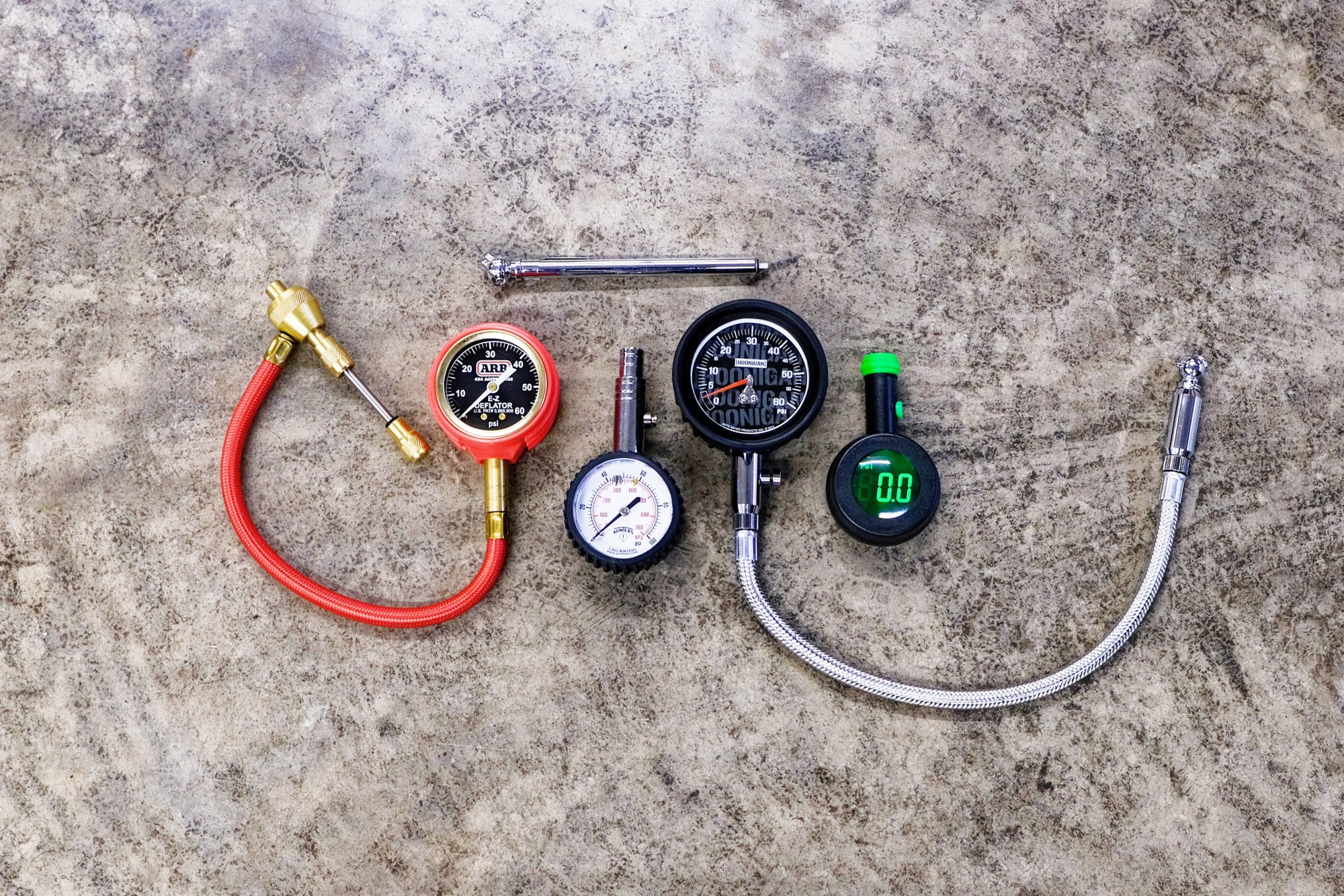 Motors
Motors
Best Tire Pressure Gauges of 2024
Maintain proper tire pressure with these top-rated gauges.
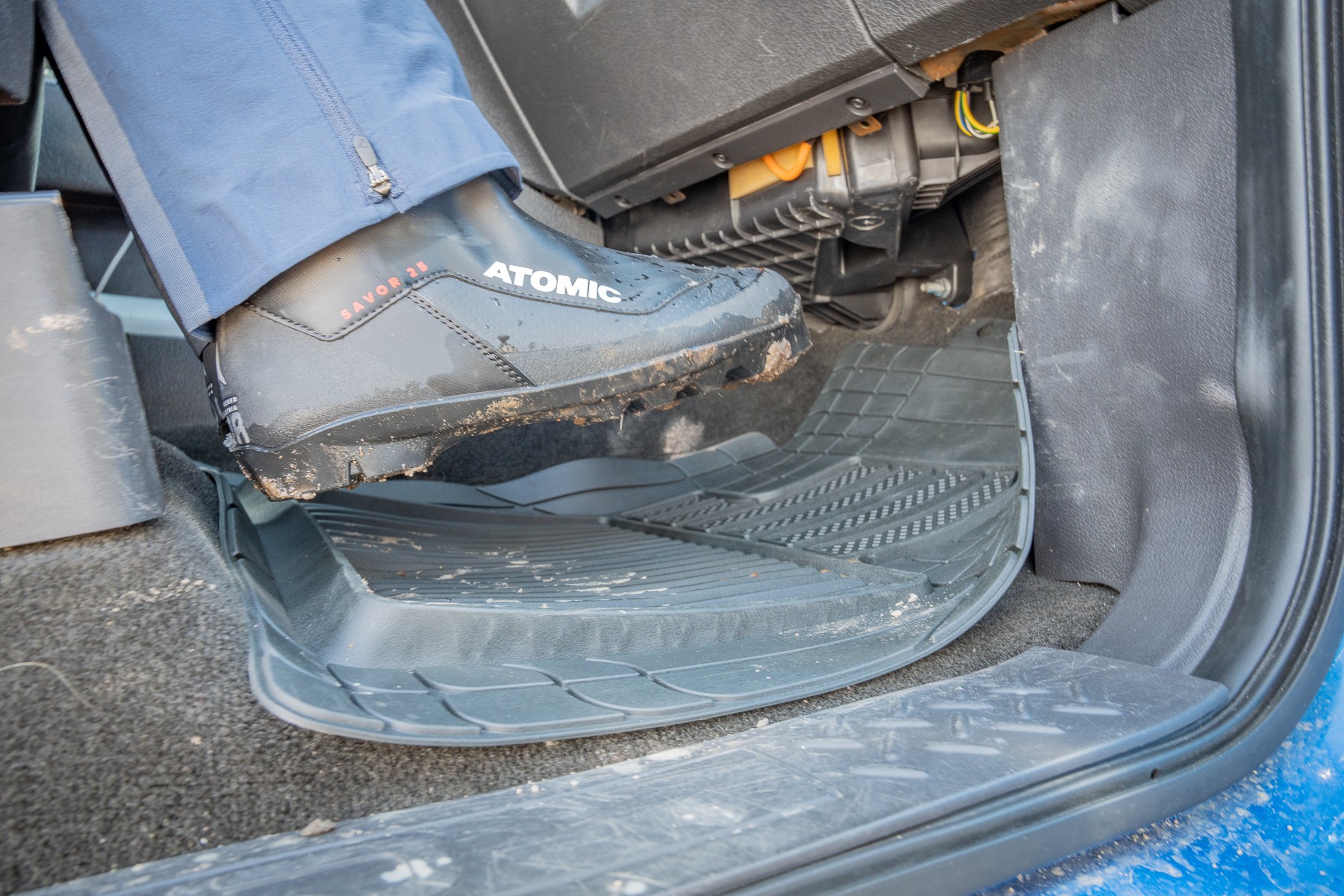 Motors
Motors
Best Car Floor Mats of 2025
Keep your vehicle interior clean with our top car floor mat picks.
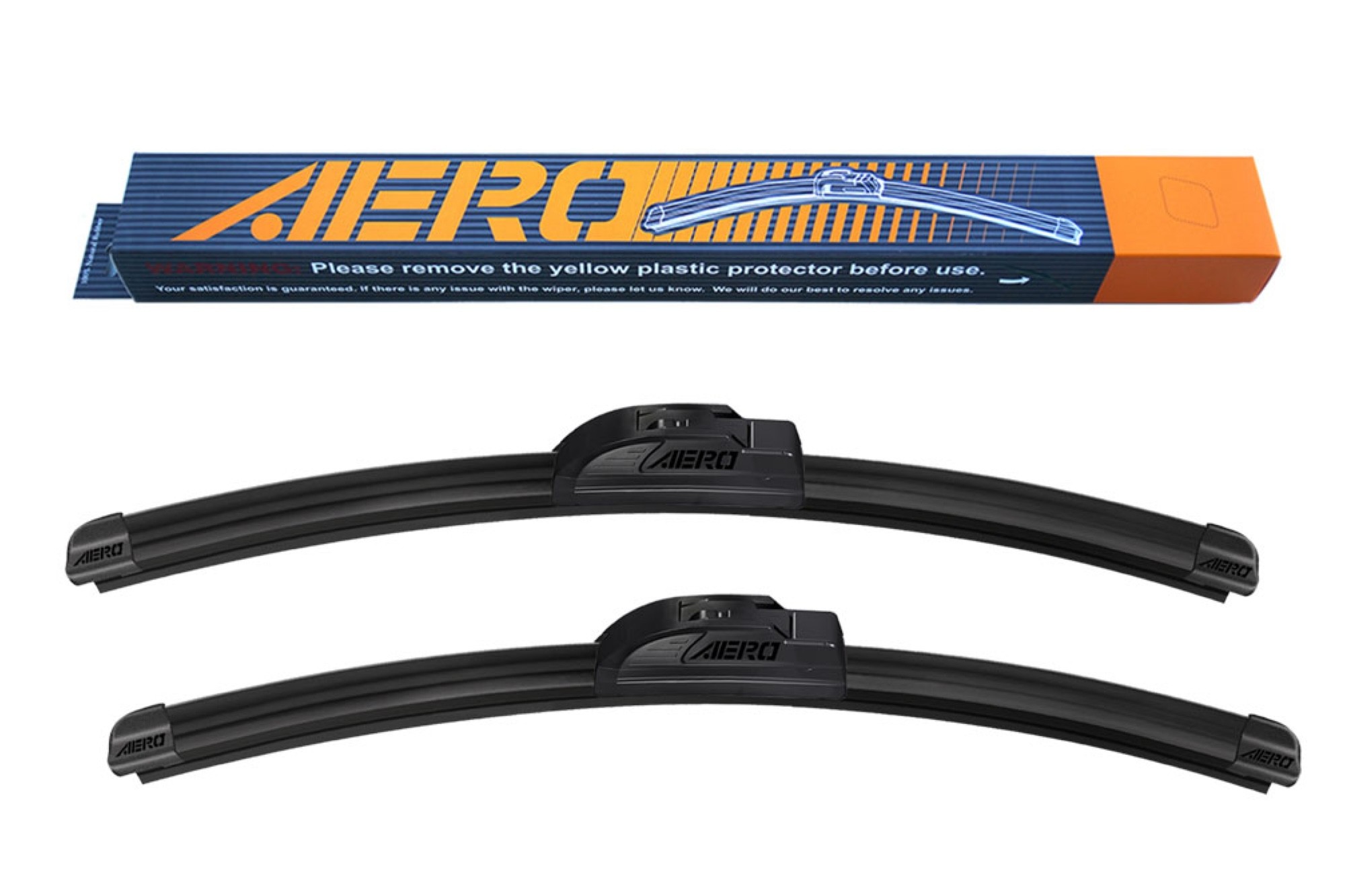 AERO Voyager J-Hook wiper blades demonstrating their beam style and rubber blade material, recognized as the best budget windshield wipers of 2025.
AERO Voyager J-Hook wiper blades demonstrating their beam style and rubber blade material, recognized as the best budget windshield wipers of 2025.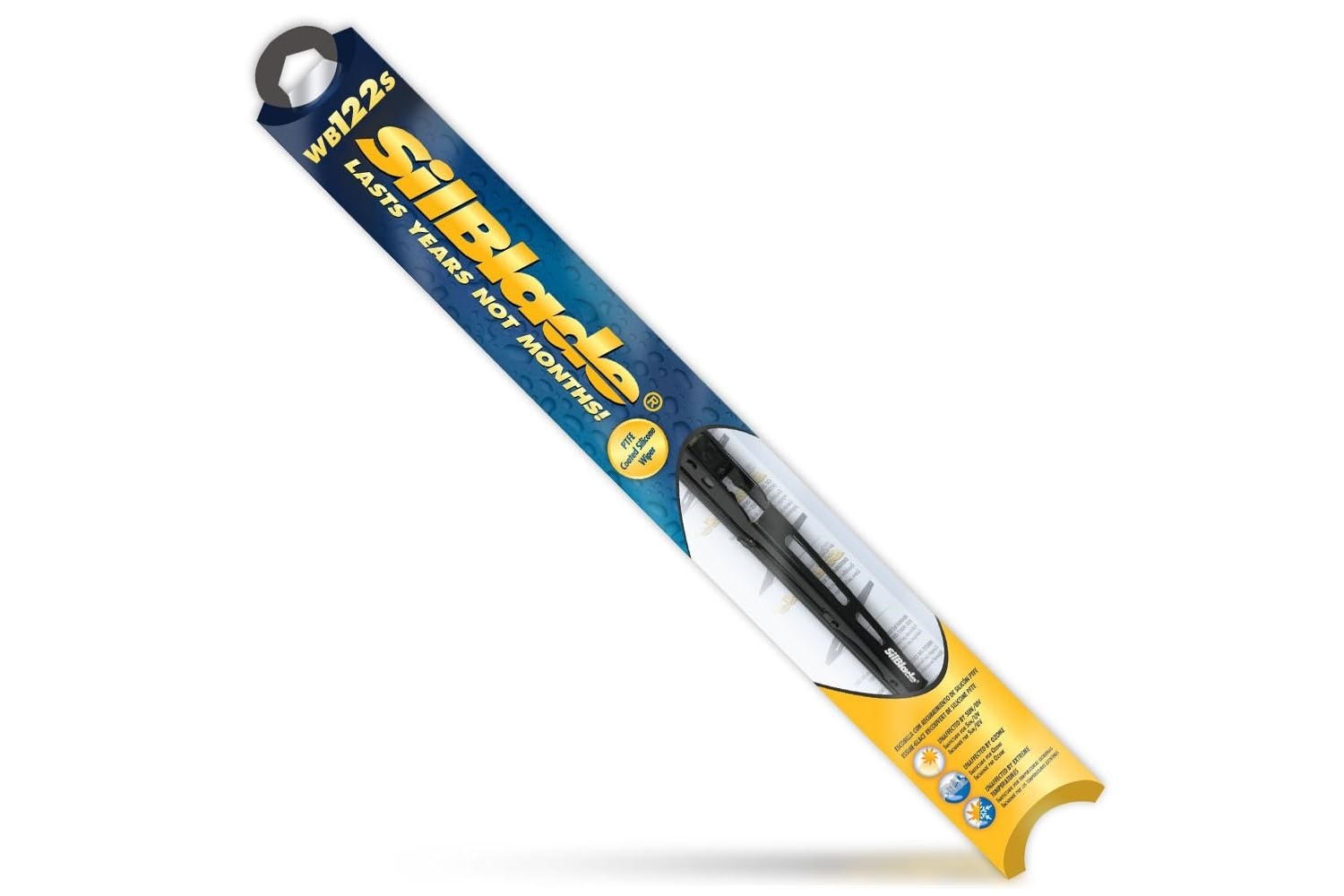 SilBlade Standard wiper blade showcasing its branch style and silicone blade material, a top choice for branch-style windshield wipers in 2025.
SilBlade Standard wiper blade showcasing its branch style and silicone blade material, a top choice for branch-style windshield wipers in 2025.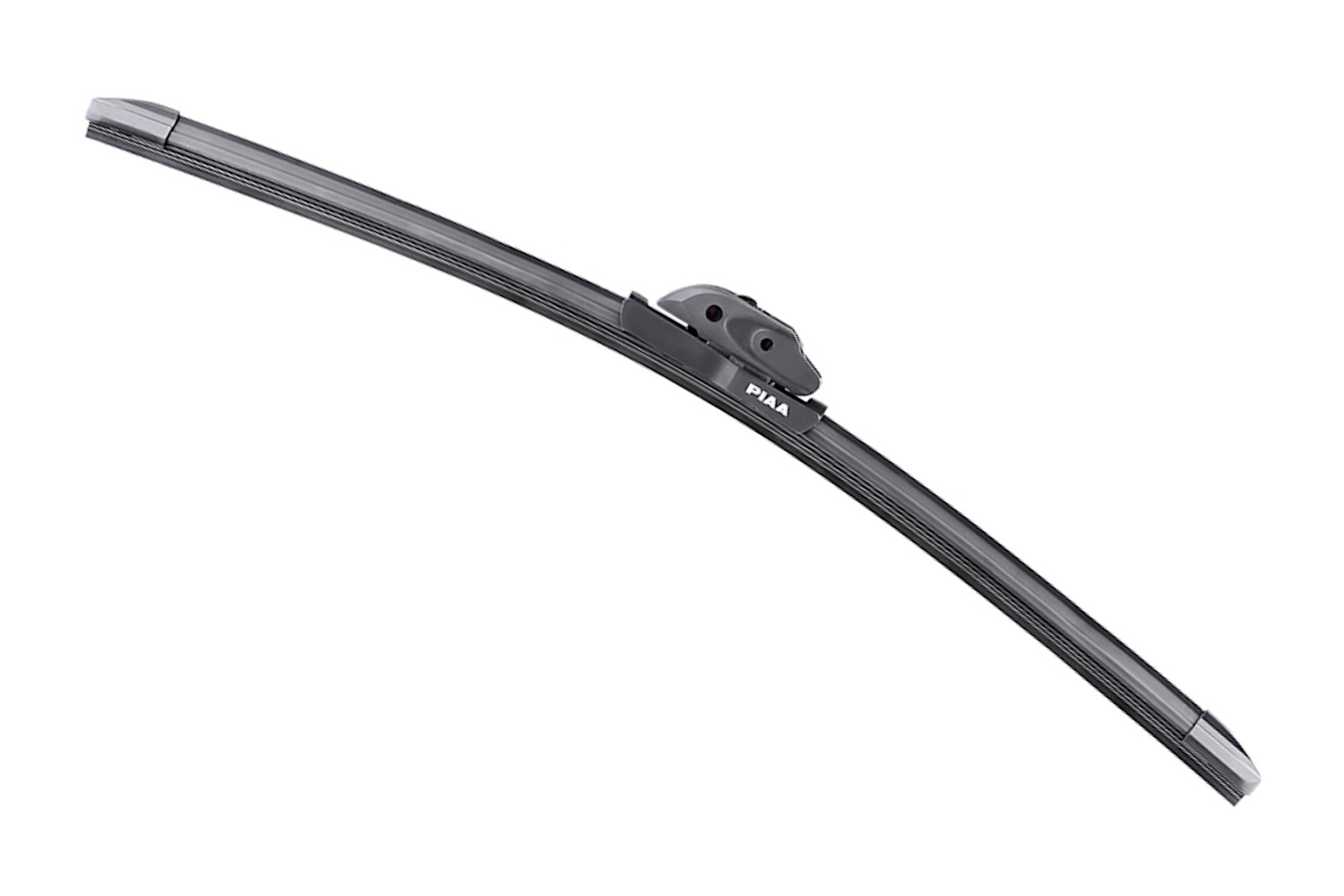 PIAA Si-Tech wiper blade showcasing its beam style and silicone blade material, recognized as the best premium windshield wipers of 2025.
PIAA Si-Tech wiper blade showcasing its beam style and silicone blade material, recognized as the best premium windshield wipers of 2025.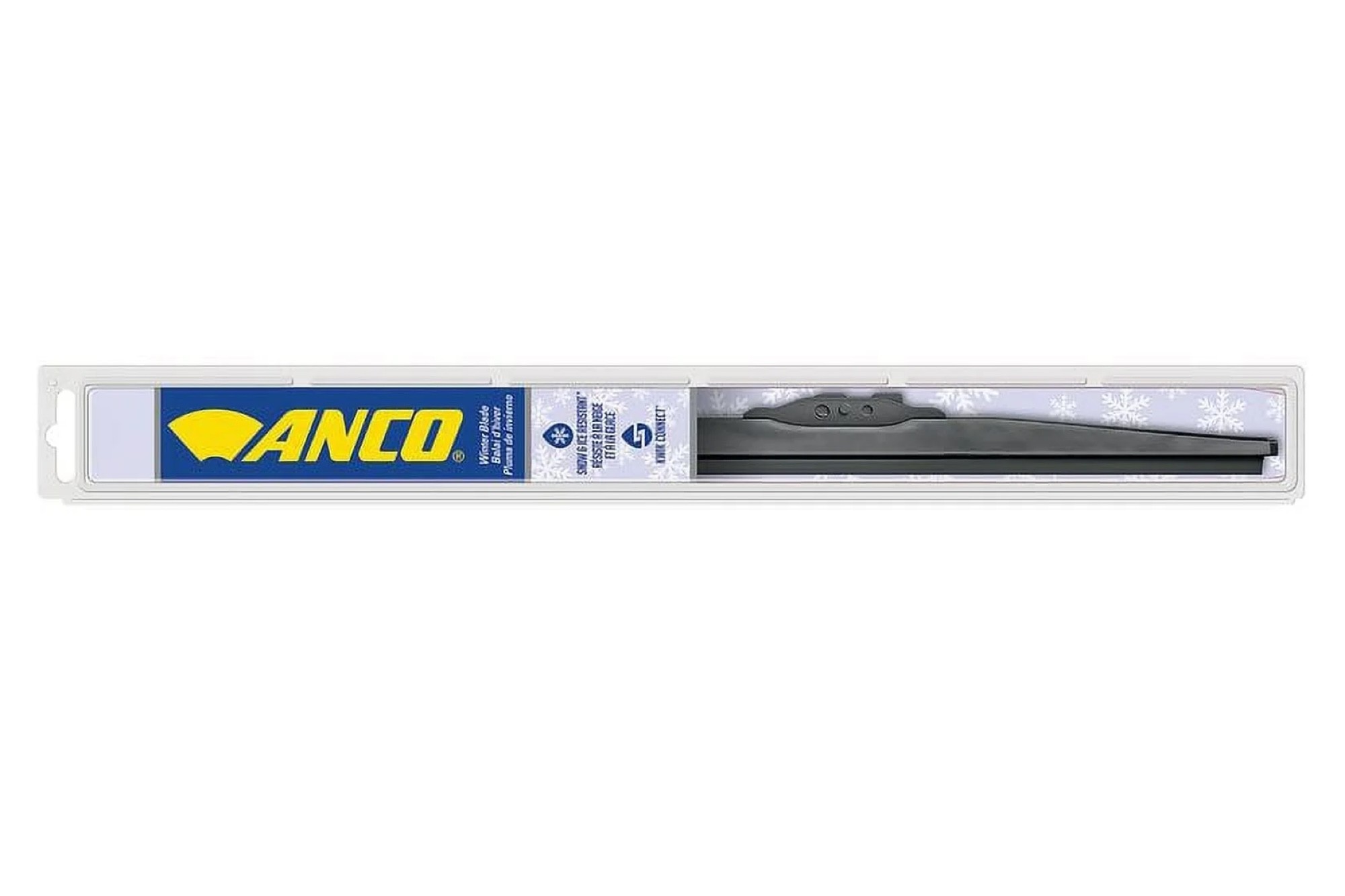 Anco Winter Wiper blade showcasing its branch style and rubber blade material, the top pick for winter windshield wipers in 2025.
Anco Winter Wiper blade showcasing its branch style and rubber blade material, the top pick for winter windshield wipers in 2025.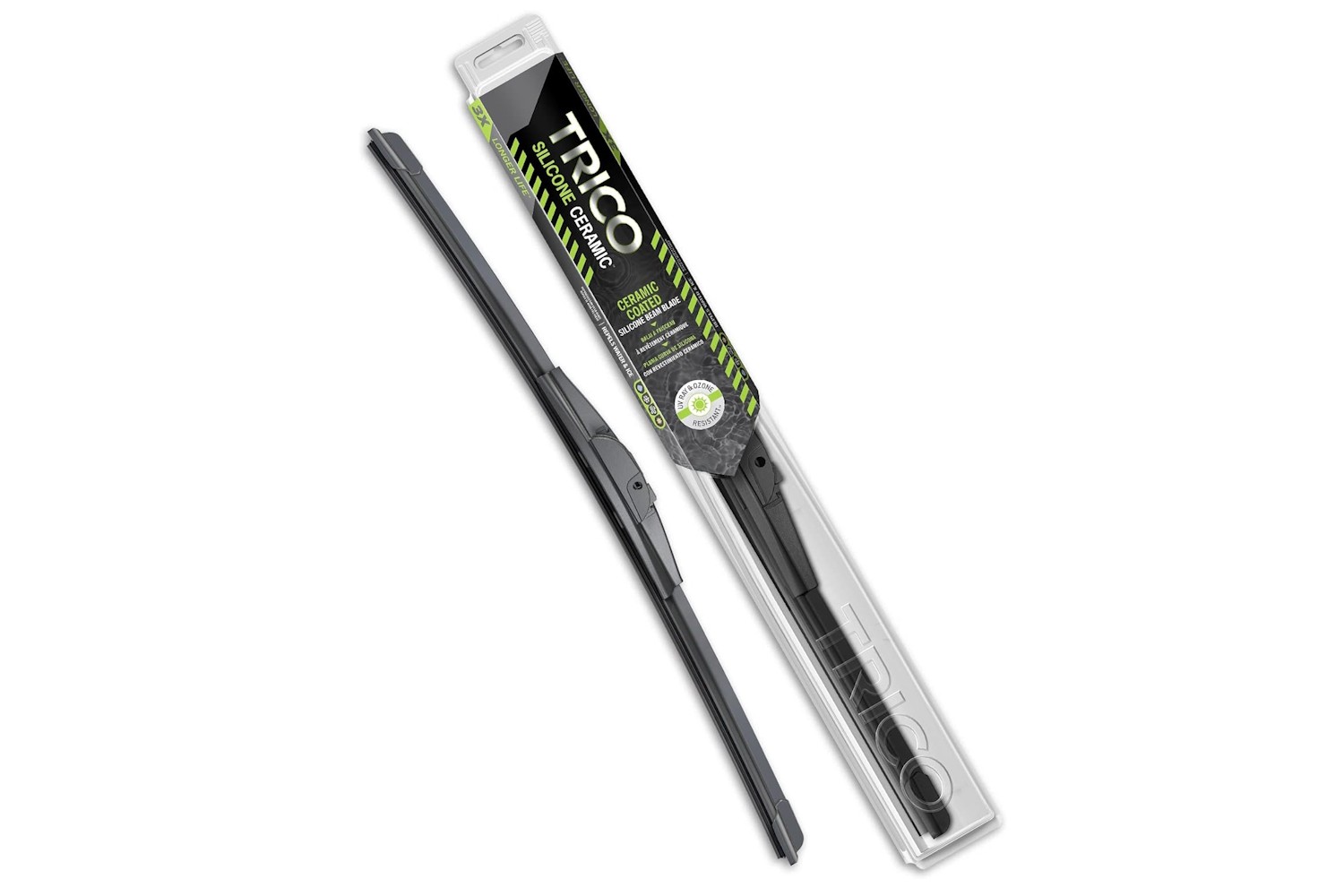 Trico Silicone Ceramic wiper blade showcasing its beam style and silicone blade material, a strong contender in the windshield wiper market for 2025.
Trico Silicone Ceramic wiper blade showcasing its beam style and silicone blade material, a strong contender in the windshield wiper market for 2025.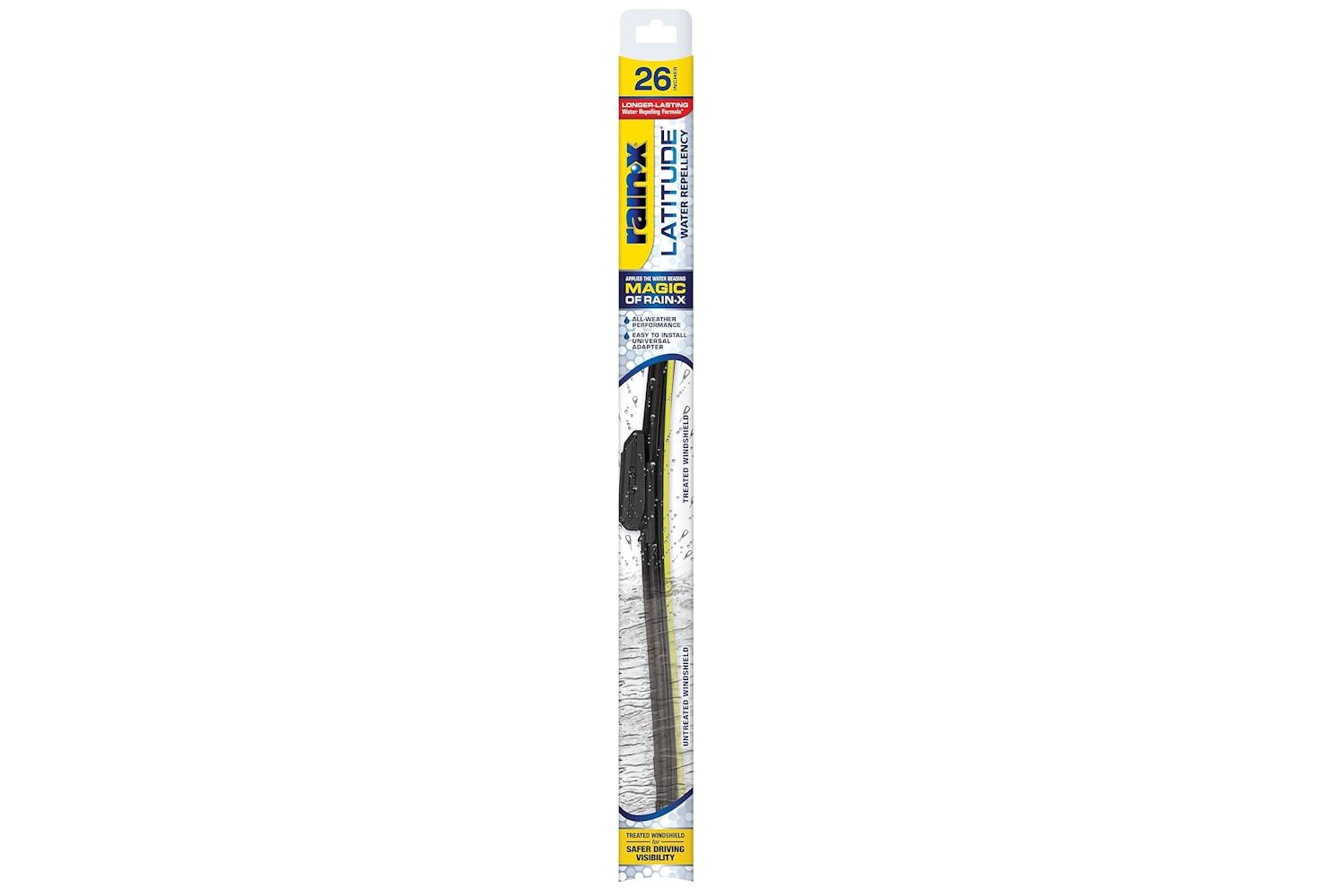 Rain-X Latitude Water Repellency wiper blade showcasing its beam style and rubber blade material with Rain-X coating, a solid mid-tier choice for windshield wipers in 2025.
Rain-X Latitude Water Repellency wiper blade showcasing its beam style and rubber blade material with Rain-X coating, a solid mid-tier choice for windshield wipers in 2025.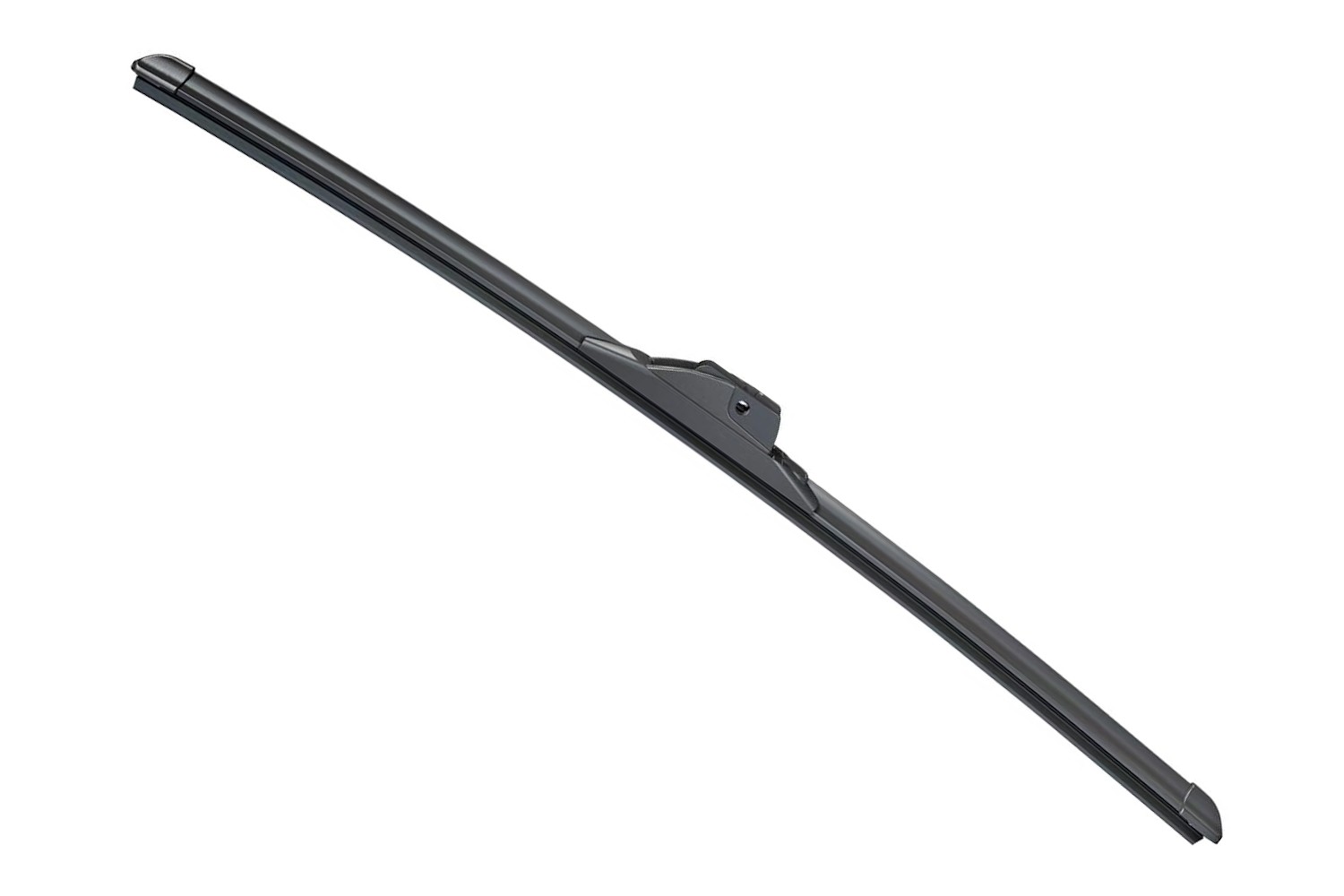 Trico Flex wiper blade showcasing its beam style and rubber blade material, a strong budget contender in the windshield wiper market for 2025.
Trico Flex wiper blade showcasing its beam style and rubber blade material, a strong budget contender in the windshield wiper market for 2025.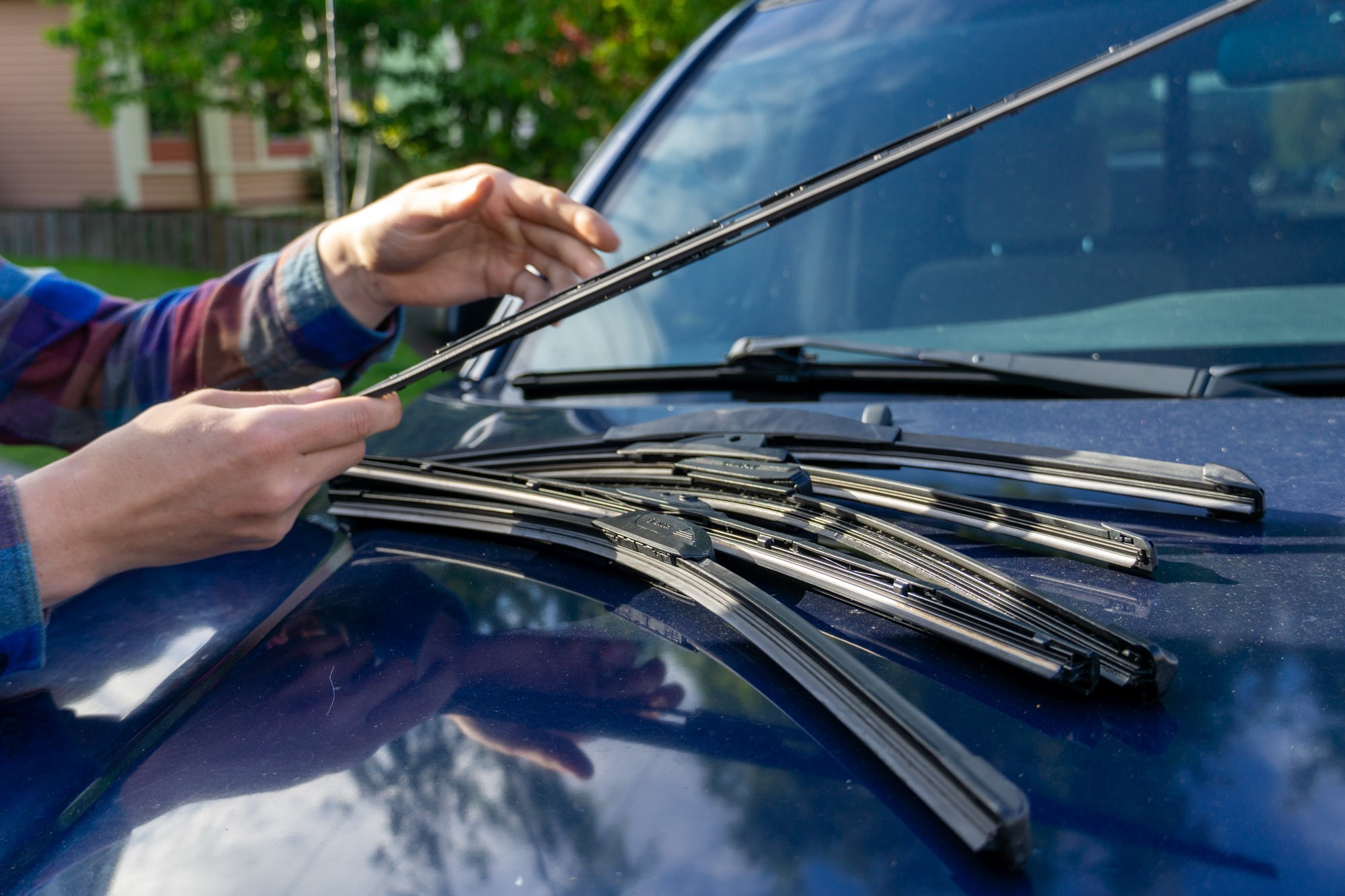 A selection of different wiper blades laid out on a truck hood, ready for installation and comparison, highlighting the variety of best wiper blades tested.
A selection of different wiper blades laid out on a truck hood, ready for installation and comparison, highlighting the variety of best wiper blades tested.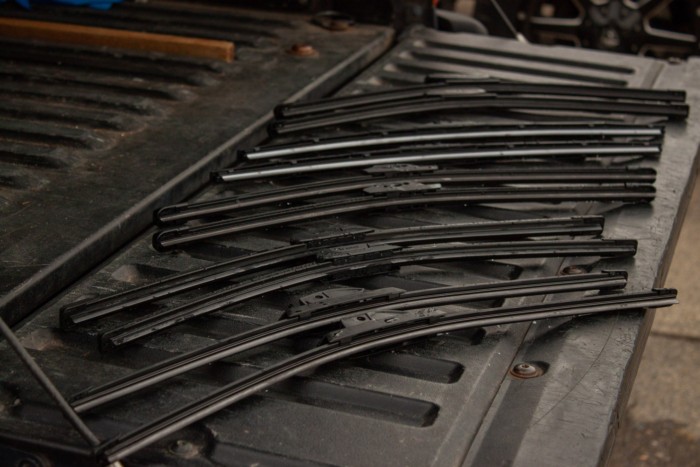 Our team diligently testing various wiper blades to determine the best windshield wipers, showcasing the rigorous testing process.
Our team diligently testing various wiper blades to determine the best windshield wipers, showcasing the rigorous testing process.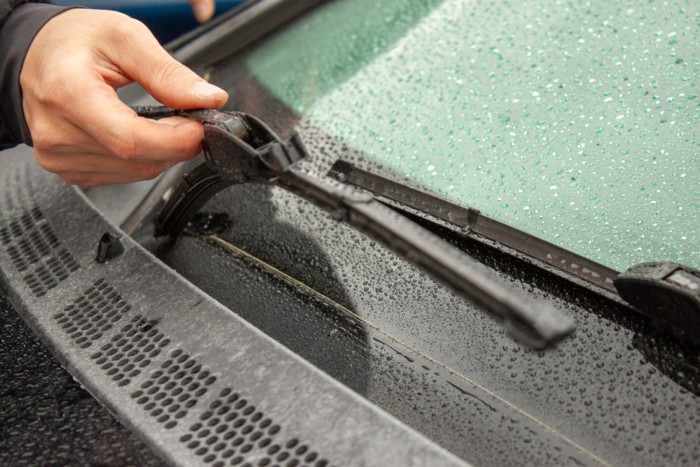 Lifting wiper blades from a wet windshield, emphasizing the importance of timely wiper replacement for clear visibility and highlighting factors to consider when choosing the best wiper blades.
Lifting wiper blades from a wet windshield, emphasizing the importance of timely wiper replacement for clear visibility and highlighting factors to consider when choosing the best wiper blades.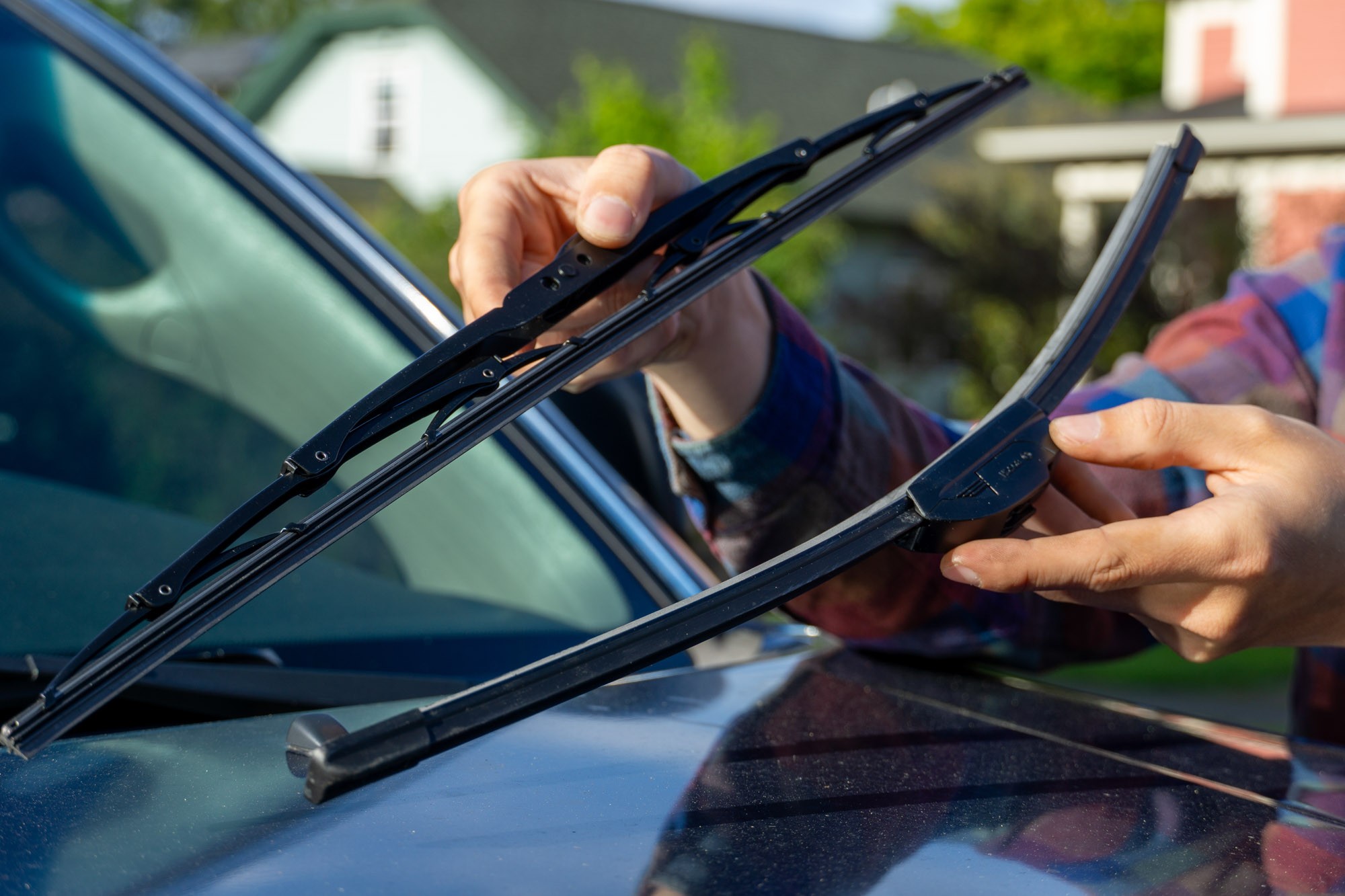 Comparing branch-style and beam-style wiper blades, illustrating the design differences and performance implications when selecting the best wiper blades.
Comparing branch-style and beam-style wiper blades, illustrating the design differences and performance implications when selecting the best wiper blades.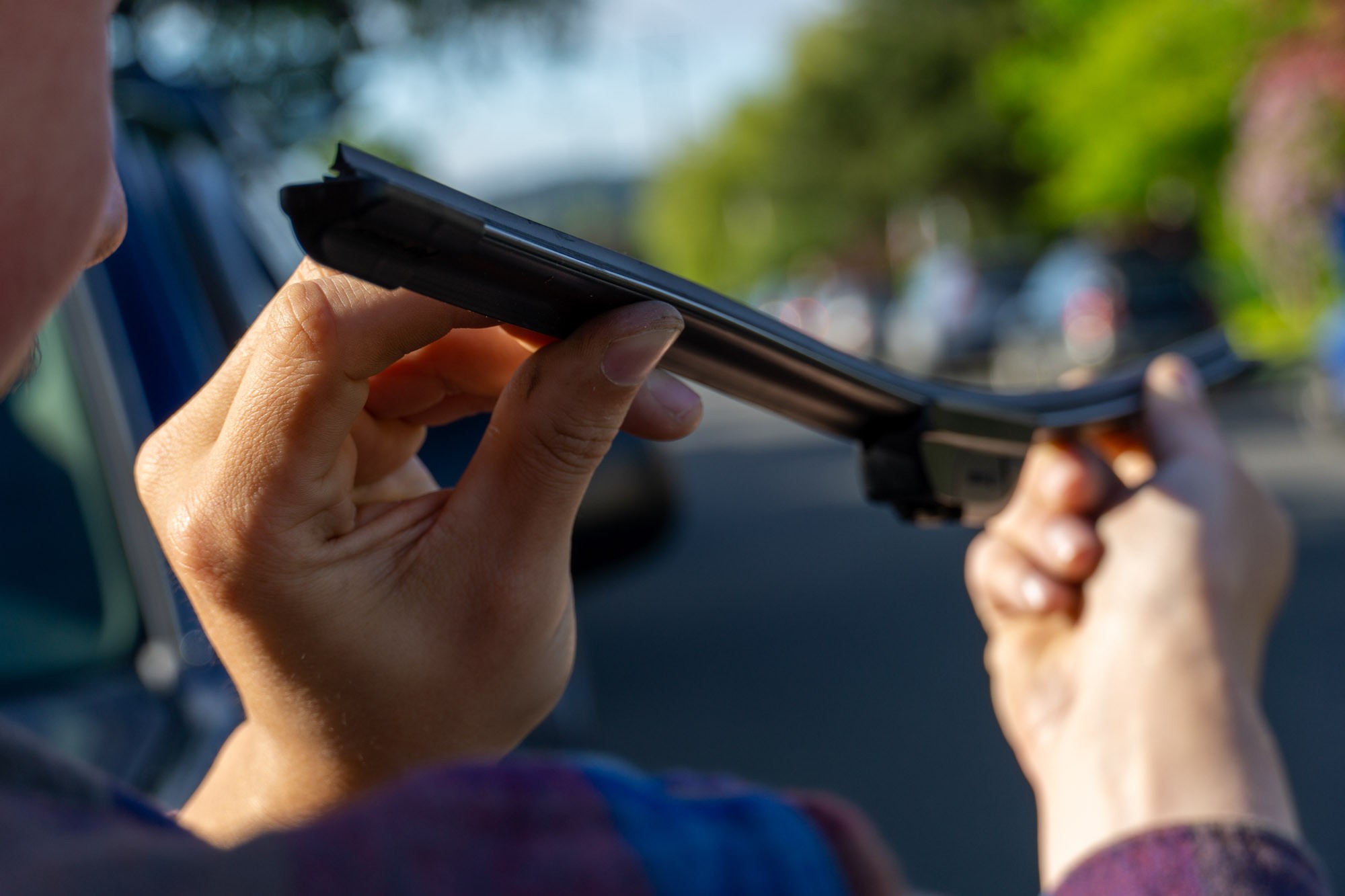 Detailing the curvature of a beam-style wiper blade, emphasizing its full contact design for optimal windshield clearing and illustrating a key feature of the best wiper blades.
Detailing the curvature of a beam-style wiper blade, emphasizing its full contact design for optimal windshield clearing and illustrating a key feature of the best wiper blades.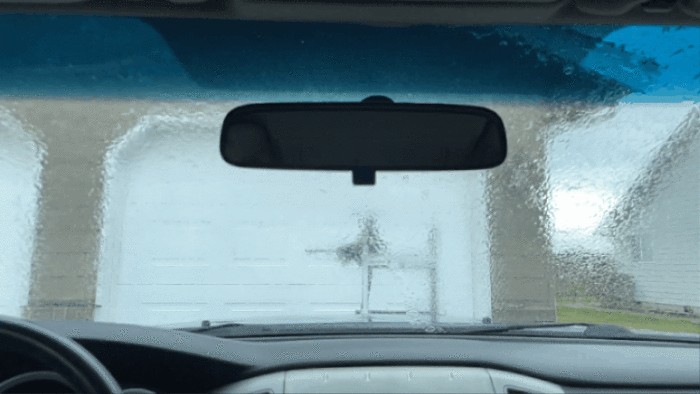 Animated GIF showing wiper blades in action during a performance test, demonstrating water clearing capability and highlighting performance aspects of the best wiper blades.
Animated GIF showing wiper blades in action during a performance test, demonstrating water clearing capability and highlighting performance aspects of the best wiper blades.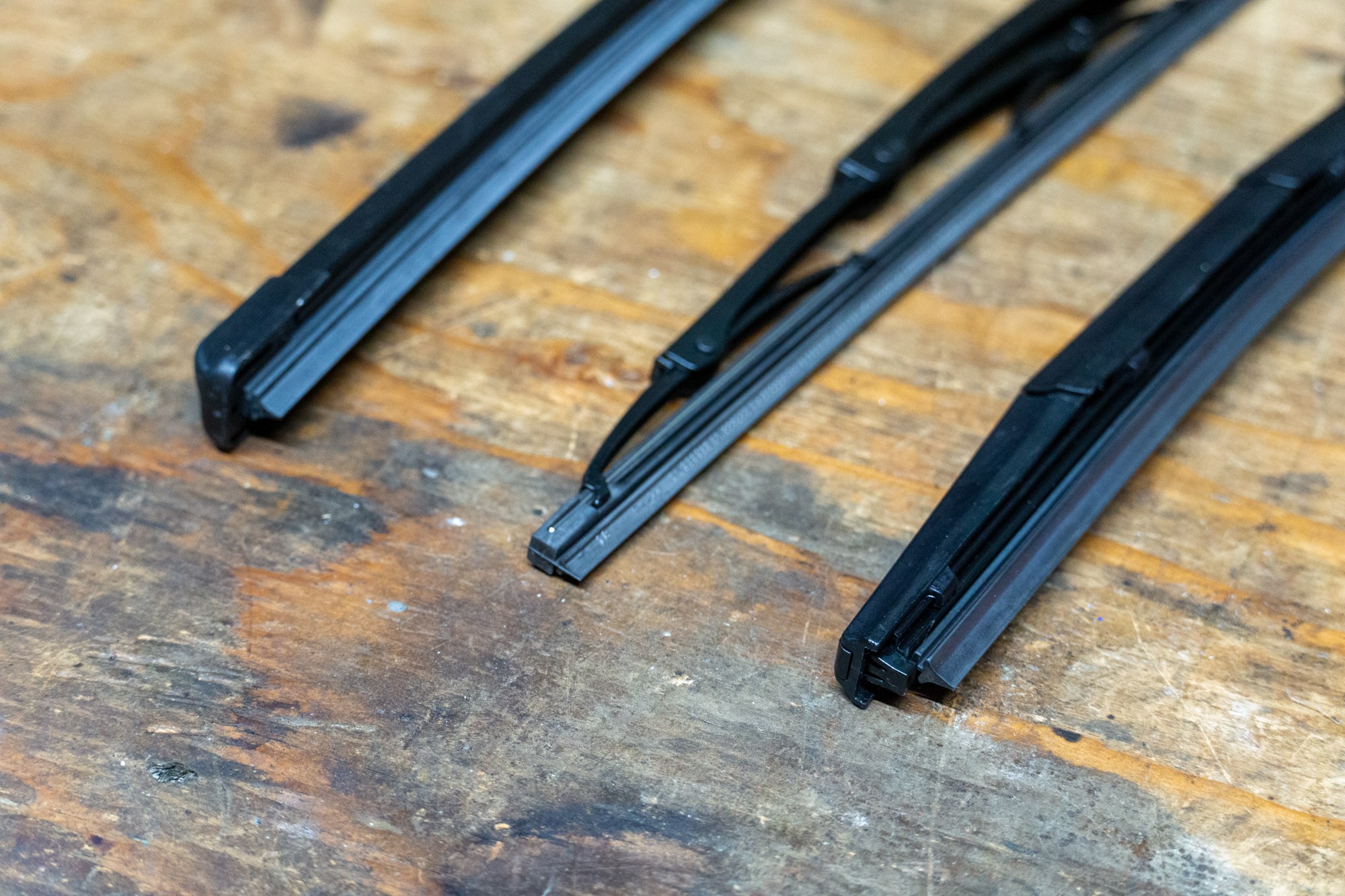 Close-up of different wiper blade materials and styles, emphasizing the variety of blade types and their impact on performance when selecting the best wiper blades.
Close-up of different wiper blade materials and styles, emphasizing the variety of blade types and their impact on performance when selecting the best wiper blades.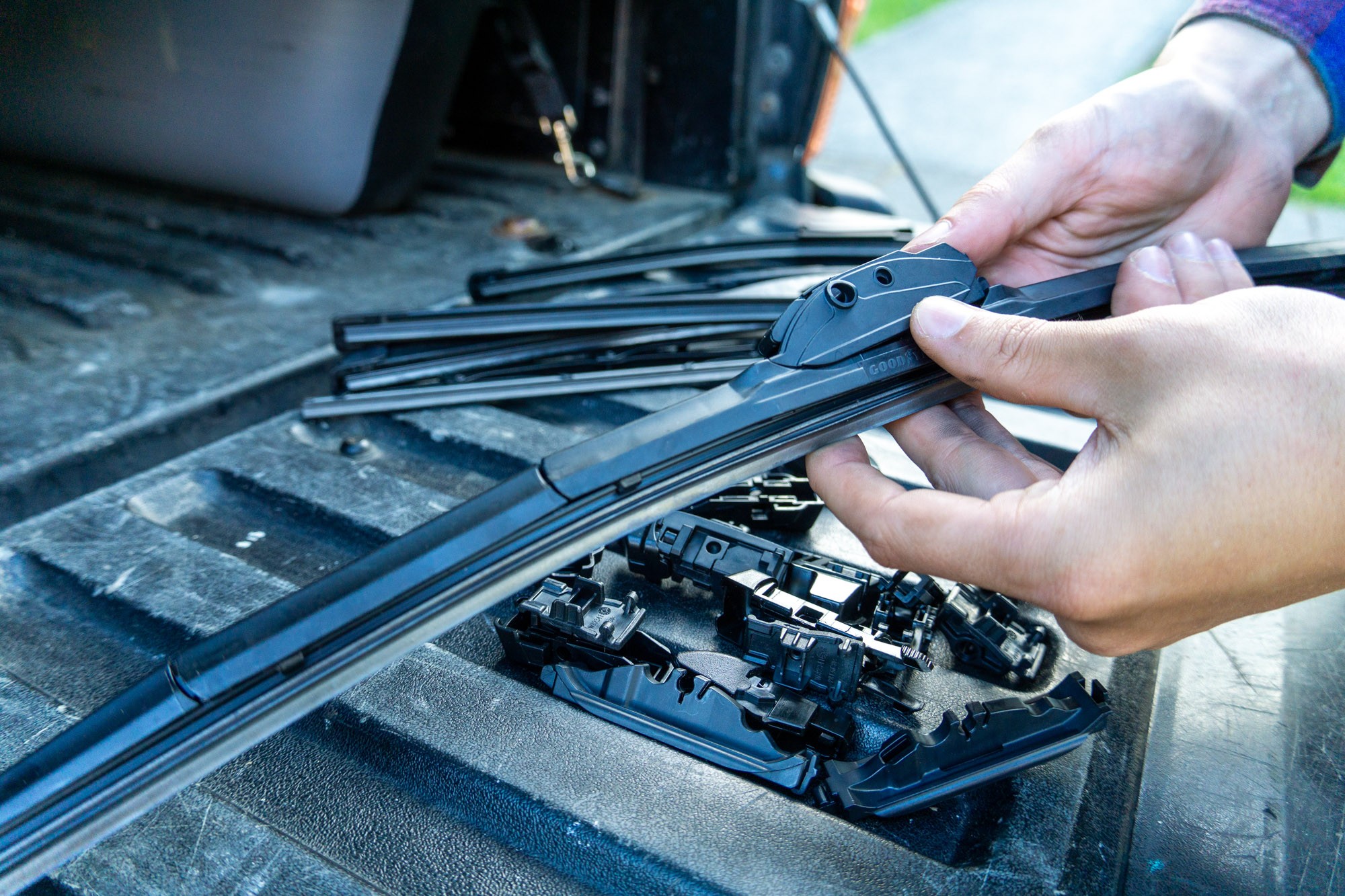 Swapping out wiper blade mounts, demonstrating the variety of attachment mechanisms and the importance of compatibility when choosing the best wiper blades.
Swapping out wiper blade mounts, demonstrating the variety of attachment mechanisms and the importance of compatibility when choosing the best wiper blades.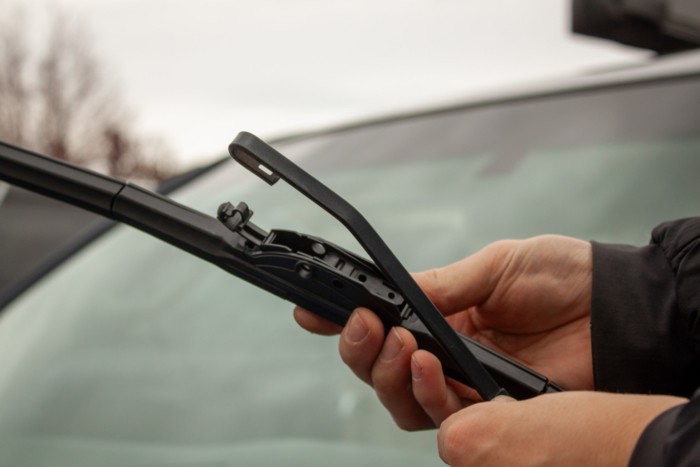 Hands attaching a wiper blade to the wiper arm, illustrating the J-hook attachment type and the ease of installation for many of the best wiper blades.
Hands attaching a wiper blade to the wiper arm, illustrating the J-hook attachment type and the ease of installation for many of the best wiper blades.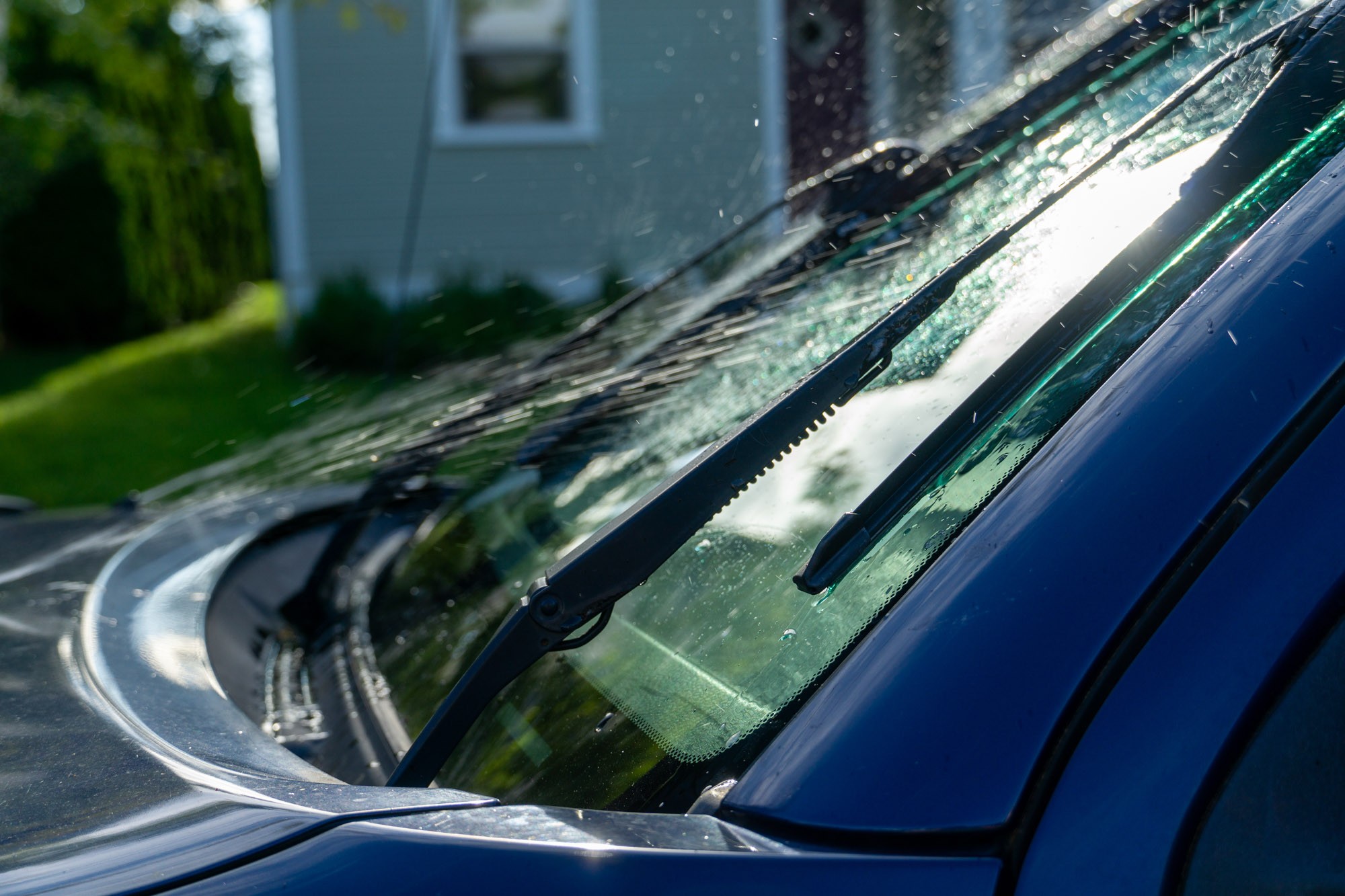 Wiper blades in action with washer fluid, emphasizing the need for effective wipers and highlighting the importance of replacing wipers before they are critically needed.
Wiper blades in action with washer fluid, emphasizing the need for effective wipers and highlighting the importance of replacing wipers before they are critically needed.